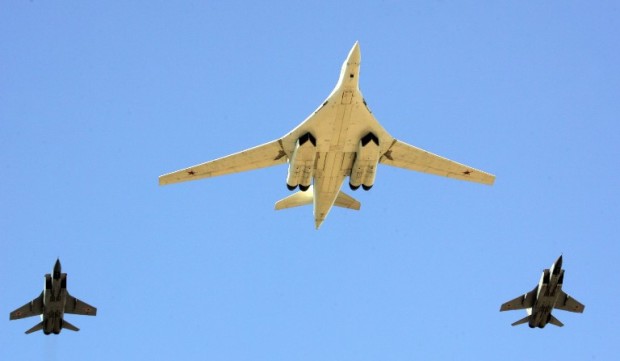
A file picture taken on April 22, 2008, shows a Russian TU-160 long-distance heavy bomber and two fighter jets flying over Moscow. Iceland AFP FILE
REYKJAVIK, Iceland — Iceland complained Monday that Russian air force bombers have been flying too close to civil airliners, the most recent incident involving a flight from Reykjavik.
The Icelandic foreign ministry said three Tupolev Tu-160 bombers flew between 6,000-9,000 feet (1,800-2,700 metres) below the plane flying from Reykjavik to Stockholm last Thursday.
The ministry told AFP it “has repeatedly objected to unidentified Russian military flights, due to the danger this may pose to passenger flights” and would be doing so again.
READ: Russian fighter in ‘unsafe’ intercept of US spy plane — Pentagon
But Aleksei Chadisky, spokesman for the Russian ambassador to Reykjavik, said the danger had been exaggerated.
“It is quite understandable that this is how the matter is presented in the local papers. This is an excuse to open the (US) naval base in Keflavik again,” he told the Morgunbladid newspaper.
Earlier this year Washington and Reykjavik signed a deal authorizing the occasional return of US forces to Iceland — a NATO member with no military of its own — amid rising tensions with Moscow,
During World War II, the Keflavik military base was a key US base and it remained important to the NATO alliance during the Cold War.
READ: Russian jets in repeated ‘aggressive’ passes of US warship
Its usefulness to the alliance then dwindled over the years, prompting Washington to withdraw its armed forces in 2006.
But in the past two years, the US military has run surveillance missions in NATO airspace operated from Icelandic territory.
“The old Russian bogey is being brought to life again,” Chadisky said.
Gudni Sigurdsson, spokesman for the Icelandic Aviation Authority ISAVIA told AFP that airline pilots had been alerted about the problem.
“This is international airspace so nothing illegal was going on,” he added.
Other Nordic countries have made similar complaints about Russian military flights in recent years which have switched-off transponders, devices that allow radars to identify planes and prevent collisions.
The Icelandic foreign ministry said that, in the latest case, the transponder failed to transmit the plane’s altitude and speed. CBB